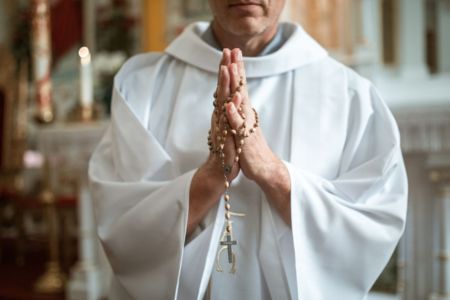In the gospels, Jesus and the Pharisees are often at odd with each other. And understandably so as the Pharisees saw the Old Covenant order as one that used the Mosaic law to safeguard Israel’s national identity, while Jesus’ mission was to bring the Old Covenant order to fulfillment by inaugurating the universal (Catholic) New Covenant order through the Church (Ignatius Catholic Study Bible New Testament, p.69). The former was a static and exclusive order that must be kept unchanged at all costs, the latter an evolving and inclusive reality achievable only through the institution of a whole new community of believers and better understanding of God’s saving plan. This explains why in the gospels, Jesus often reserved his harshest words for the Pharisees. Oddly enough, in this Sunday’s gospel, Jesus offers a rare recognition of the authority of his nemeses:
"The scribes and the Pharisees have taken their seat on the chair of Moses. Therefore, do and observe all things whatsoever they tell you, but do not follow their example.” (Mt. 23:2-3)
Sitting on the chair of Moses, whether physically or symbolically, refers to the Pharisees’ special teaching authority in guiding people to understand and follow the law of Moses. It’s a divinely decreed authority that can be traced back in an unbroken line to Moses himself (see T. Lane, The Catholic Priesthood – Biblical Foundations, p.174). The mystery of divine providence can be seen in the exclusion of the Sadducees from this divinely decreed authority, who taught falsely against resurrection (cf. 22:23-33).
An authority this special should be used well. But the Pharisees failed terribly to do so because “they preach but they do not practice” (23:3). This is why Jesus went on to call them “hypocrites”, “blind guides”, even “whitewashed tombs” (23:13, 24, 27).
Blessed with a similar but no less important authority, the Levitical priests during the prophet Malachi’s time also didn’t make good use of the special power given to them by divine decree - the “covenant of Levi” (Mal 2:8). As descendants of Aaron, brother of Moses and the first high priest appointed by God, they were given the privilege to offer daily sacrifices and serve God in the Jerusalem Temple (Ex 28:1-2). They dishonored God by offering blemished sacrifices, “and have caused many to falter by [their] instruction” (Mal 2:8). The prophet chastises them for their abuses, corruption, and religious indifference, warning them God “will send a curse upon you and of your blessing [He] will make a curse” (2:2). He foresees the time when sacrifices from the Jews will not be accepted and all nations will offer a pure oblation (cf. 1:11) - a prophecy fulfilled in the Sacrifice of the Mass of the Catholic Church!
The self-serving Levitical priests in Malachi’s time and the hypocrisy of the Pharisees, both of whom have been commissioned to serve by divine decrees, are contrasted with St. Paul and his missionary co-workers’ unreserved outpouring of love for the Thessalonian church in the second reading. St. Paul and companions have also been commissioned to serve as apostles by divine decree. But the way they carry out God’s commissioning stands in stark contrast to the fore-mentioned priests and the Pharisees. They do so through “toil and drudgery. Working night and day in order not to burden any of you” (1 Thes 2:9). Like “a nursing mother [who] cares for her children”, they serve with gentleness and affection for the church faithful, “determined to share with you not only the gospel of God, but our very selves as well, so dearly beloved had you become to us” (2:7-8). “Dearly beloved” was not exactly how the Pharisees and the priests in Malachi’s time saw the people entrusted to their care by God.
